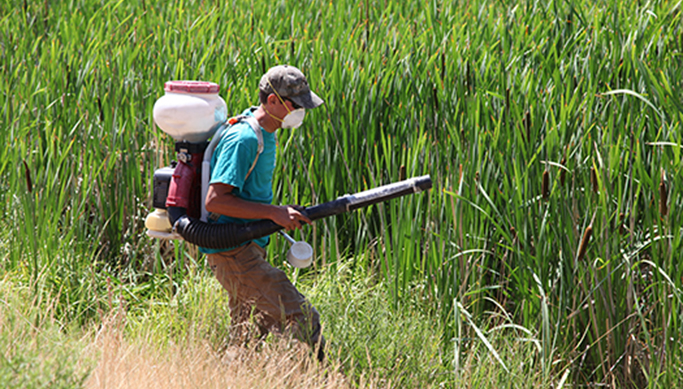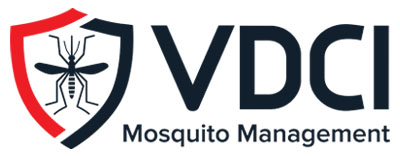
Common Mosquito Management FAQs
Over the years, our team has been asked several questions about the control of mosquito populations. Below are the questions we hear most often.
Why Don’t You Spray My Neighborhood More Often?
Answer: VDCI’s programs focus on controlling larval mosquitoes while they are still in their aquatic habitat whenever possible because that is the most environmentally friendly means of control. Ultra-Low Volume Spraying to control adult mosquitoes is done only when necessary, based on routine surveillance of mosquito populations and mosquito-borne diseases. Adult mosquito traps are set weekly and track local population levels over time. Within each program thresholds for spraying are set and when mosquito populations reach these thresholds, targeted applications are made to these specific areas. In some programs, the threshold for spraying is based on the prevalence of diseases, such as West Nile virus, occurring within the local mosquito populations. Please see the section on Adult Mosquito Monitoring on the Mosquito Control Page for more information.
What Do You Spray With?
Answer: Ultra-Low Volume (ULV) Spraying for adult mosquitoes is normally done with a synthetic pyrethroid insecticide, permethrin. Permethrin is in a group of insecticides which are man-made versions of a natural insecticide derived from a type of chrysanthemum. Permethrin is one of the “least-toxic” products registered with the U.S. EPA for adult mosquito fogging. Please see section on Adult Mosquito Control on the Mosquito Control Page of this website for more information.
What Effect Does Spraying Have On Other “Beneficial” Insects, Pets, And Humans?
Answer: Extensive studies have shown little or no effect on beneficial insects from ULV spraying for adult mosquitoes. By A) limiting applications to areas with documented high annoyance or threat of disease, B) utilizing specialized Ultra-Low Volume technology (applications at approximately 1.0 ounce per acre, with specifically-sized microscopic droplets of a low toxicity product), and C) timing applications only during the evening when mosquitoes are at their peak activity period, and most other non-target insects are not active, we are able to minimize non-target effects. As far as pets and humans are concerned, ULV technology again allows us to apply a very small amount of a very low toxicity product over a large area, which means the amount of product people are exposed to is minimal. Additionally, these products breakdown very rapidly in the environment and do not bio-accumulate. For more information, please visit our Pesticides Page.
What Can I Do To Control Mosquitoes Around My Yard?
Answer: There is a lot you can do! Please visit our Personal Protection Page for more information.
Why Don’t You Use Birds Or Bats And Other Biological Controls Instead of Chemicals?
Answer: As part of VDCI’s Integrated Mosquito Management programs we primarily use biological larval control agents such as Bti (Bacillus thuringiensis, var. israeliensis) and Bsph (Bacillus sphaericus). Certain fish species can be effective in some situations for larval control as well. Unfortunately, there are no real biological control alternatives to use on a large scale against adult mosquitoes. Birds and bats may eat some mosquitoes but overwhelming scientific evidence has shown that it’s not enough to make a significant difference in the mosquito populations. They often seek out larger insects, like moths, to support their nutritional intact. Please see our section on bats on our Myths, Misconceptions, and Misidentifications Page for more information.
How Do You Decide When And Where To Spray?
Answer: Ultra-Low volume (ULV) fogging for adult mosquitoes is based on surveillance data gathered from a network of traps that monitor adult mosquito population levels and the presence of mosquito-borne diseases. Calls from residents concerning mosquito annoyance problems also help us to pinpoint “hot-spot” areas.
Are There Any Non-Chemical Alternatives That Work Against Mosquitoes?
Answer: As discussed above, there are several biological alternatives for larval mosquito control, but no proven alternatives for controlling adult mosquitoes. Many natural products such as garlic oil have been studied as natural repellents, but show only limited success.
What Repellents Work The Best?
Answer: Repellents containing 10%-30% DEET (N, N-diethyl-meta-toluamide) are widely regarded as the most effective against mosquitoes. Products containing DEET in concentrations greater than 30% provide no additional protection, although they may last longer. Other repellents considered effective contain Picaridin, IR3535, or Oil of Lemon Eucalyptus. Whenever you use an insecticide or insect repellent, be sure to read and follow the manufacturer’s DIRECTIONS FOR USE, as printed on the product, especially when children are concerned. Note: Many products such as Vitamin B, ultrasonic devices, and others have not been proven effective in preventing mosquito bites.
I’ve Heard Of Integrated Pest Management (IPM), Why Don’t You Use IPM On Mosquitoes?
Answer: VDCI’s programs are Integrated Mosquito Management (IMM) programs which are, in fact, scientifically-based IPM programs designed specifically for mosquito control. The foundation of VDCI’s IMM programs is accurate and routine larval and adult mosquito surveillance. Our larval mosquito control activities, which utilize biological controls and “least-toxic” products, are the focus of our control efforts as much as possible because they are the most environmentally sound techniques available. Adult mosquito control is the last resort and targets areas with severe annoyance problems and/or disease potential. Finally, public education and outreach are an integral part of our IMM programs because an educated and involved public can dramatically help reduce mosquito populations. For more information please visit the Integrated Mosquito Management Page.
I’m A Beekeeper, How Can I Avoid Harmful Spraying In My Area?
Answer: Complete this form and provide us with information regarding your bee yard, apiary, or beehive. With these details, we can better avoid spraying and otherwise treating the immediate area with chemicals that might affect the health and welfare of your bees and their habitat.
Since 1992, Vector Disease Control International (VDCI) has taken pride in providing municipalities, mosquito abatement districts, industrial sites, planned communities, homeowners associations, and golf courses with the tools they need to run effective mosquito control programs. We are determined to protect the public health of the communities in which we operate. Our mosquito control professionals have over 100 years of combined experience in the field of public health, specifically vector disease control. We strive to provide the most effective and scientifically sound mosquito surveillance and control programs possible based on an Integrated Mosquito Management approach recommended by the American Mosquito Control Association (AMCA) and Centers for Disease Control and Prevention (CDC). VDCI is the only company in the country that can manage all aspects of an integrated mosquito management program, from surveillance to disease testing to aerial application in emergency situations.


